SE cnr George and Cameron Streets. Google Maps.
also known as Anchor & Hope
1826-30 William Patten, Hope & Anchor, Cameron Street
1830-33 Thomas Inall, Hope & Anchor, Cameron Street
1834 Isaac Solomon, Hope and Anchor, George Street
1835 Josias MacEllan, Hope and Anchor, Cameron & George Street
1835-1841 Josias McAllan, Glasgow Tavern
1842-43 Josias McAllan, Glasgow Wine Vaults, George & Cameron-streets
1843-50 Richard Scott, Glasgow Wine Vaults, George & Cameron Streets
1850-55 James Williams, Glasgow Wine Vaults, George & Cameron Streets
1855 Refused
1856 Joseph Grigg, as a boarding house
1856-62 Joseph Grigg, Glasgow Wine Vaults, Cameron and George-streets
1862-83 Philip Davis, Glasgow Wine Vaults, Cameron and George-streets
1883 Refused
1884 Philip Davis, Glasgow Wine Vaults, Cameron & George Streets
1884 Alfred Davis, Glasgow Wine Vaults, Cameron and George-streets
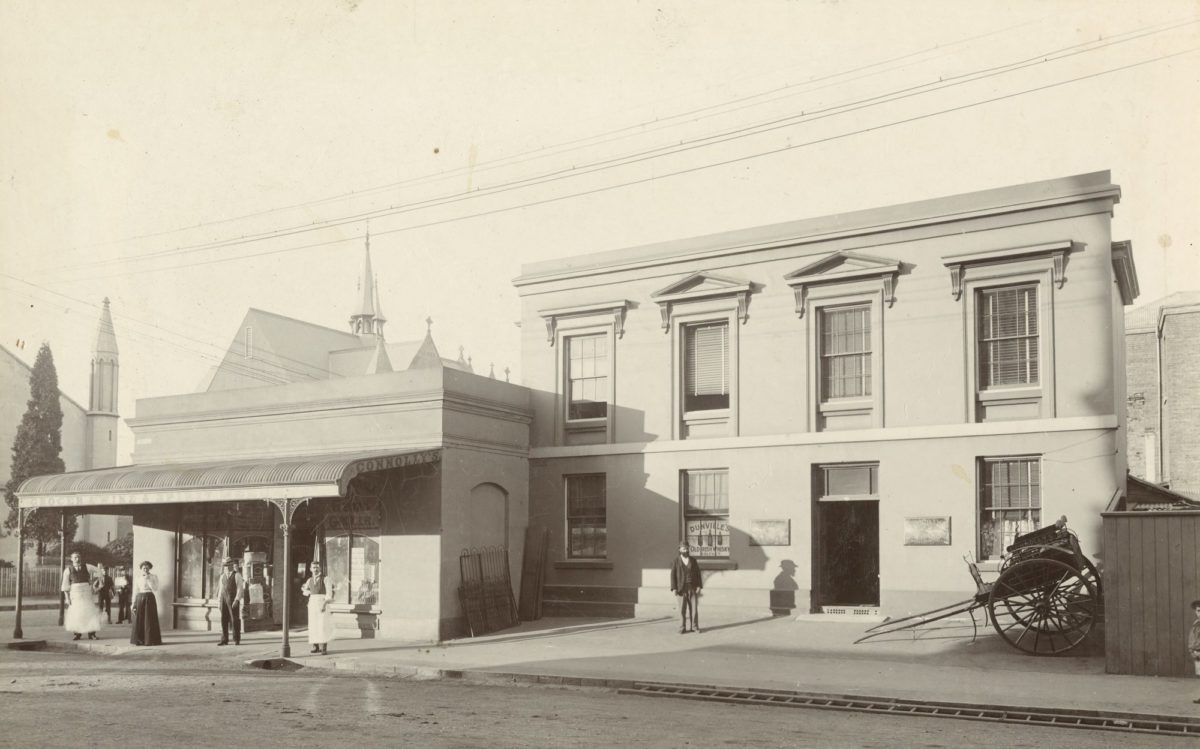
“Photograph – D J Connolley’s store, corner Cameron and George Streets, Launceston”, from Libraries Tasmania
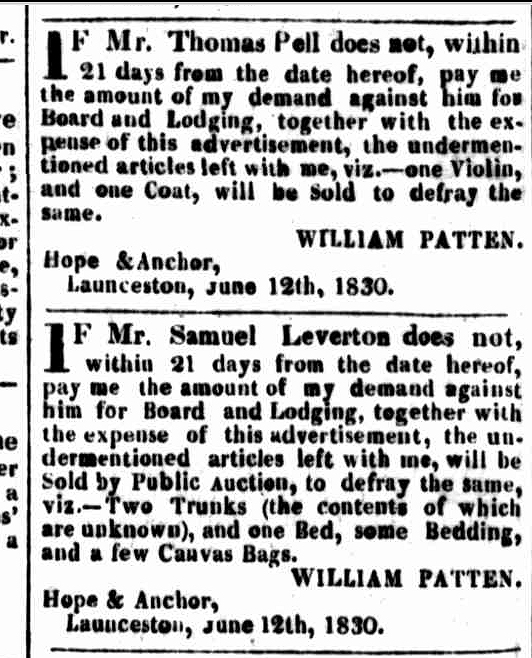
Launceston Advertiser, 14 June 1830
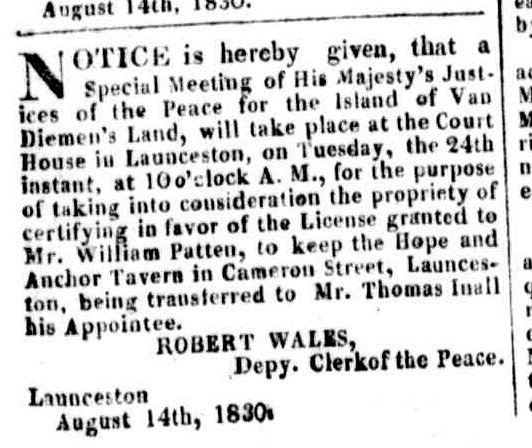
Launceston Advertiser, 16 August 1830
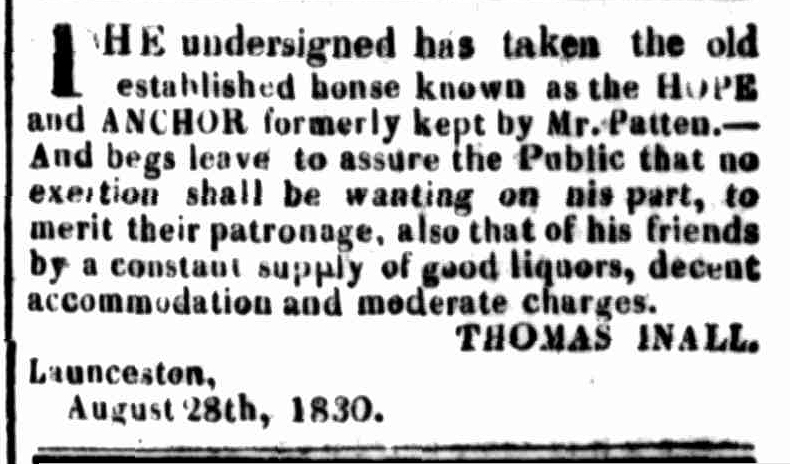
Launceston Advertiser, 6 September 1830
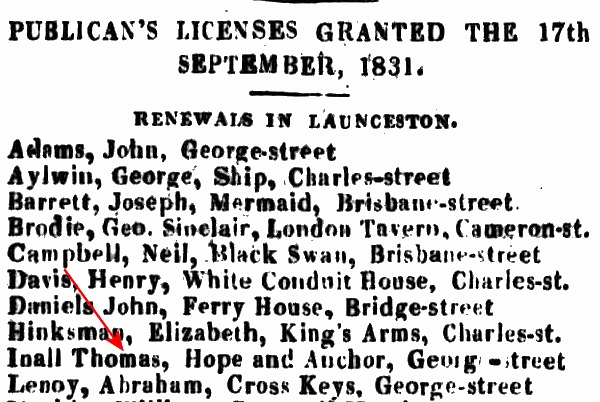
Launceston Advertiser, 26 September 1831
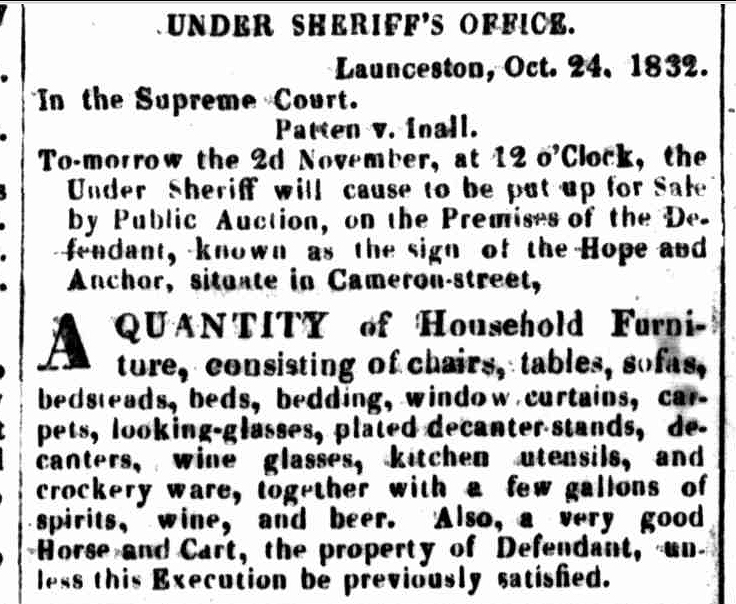
Launceston Advertiser, 1 November 1832

Launceston Advertiser, 19 May 1834
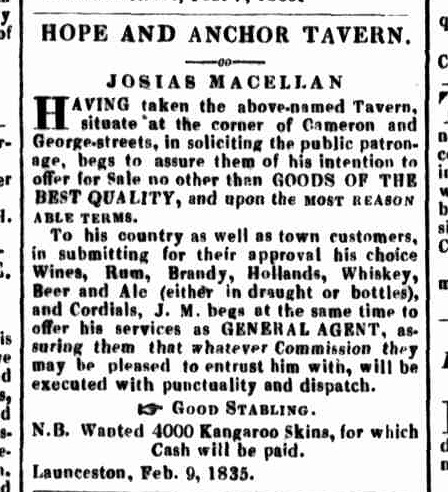
Launceston Advertiser, 16 February 1835
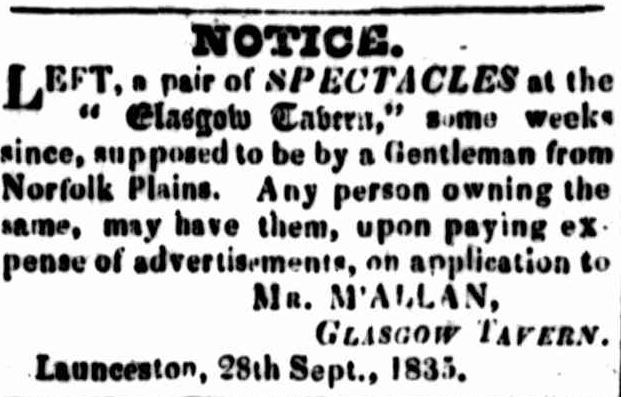
Cornwall Chronicle, 3 October 1835
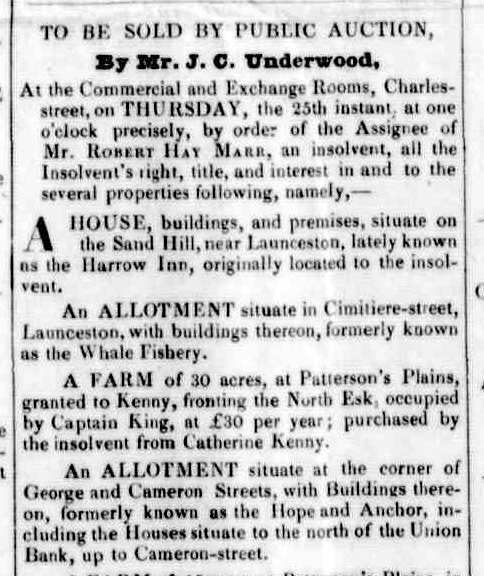
Launceston Advertiser, 18 July 1839
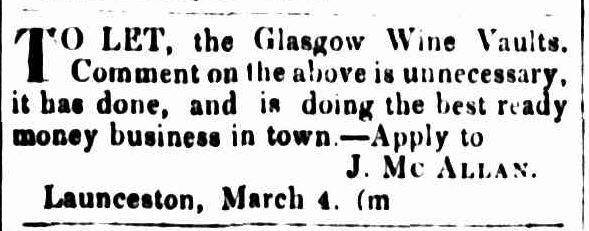
Cornwall Chronicle, 11 March 1843
TRANSFER DAY.-Monday last being the first quarterly meeting of justices for granting transfers and certificates of approval of new licenses, the following magistrates assembled for that purpose: W. Gunn, Esq. (chairman), J. R. Bateman, Esq., K. J. King, Esq , J. Cameron, Esq., W. G. Sams, Esq. The only two applications for transfers were from Robert Edwards, “Tamar Hotel,” to Joseph Thorn; and from Richard Scott, ” Glasgow Wine Vaults,” to James Williams, both of which were granted.
Launceston Examiner, 6 November 1850

Launceston Examiner, 21 December 1850
From “New Licensing Act.–First Meeting of Justices”:
James Williams, Glasgow Wine Vault, George-street
The police magistrate referred to a case of alleged disrespect to Mr. Gregson, when visiting the house, which the applicant explained in a most excited strain. Granted.
Launceston Examiner, 2 December 1854
New Licensing Act Again. — At the police office on Saturday last, Mr. James Williams, the landlord of the Glasgow Wine Vaults, George street, was charged with a breach of the New Licensing Act, in having the outer-door of his house open after ten o’clock at night. Mr. Williams pleaded guilty to the offence, and contended that it was impossible for any licensed victualler to comply rigidly with the restrictions of the new act. He thought that if the police chosed to act to the strict letter of the law, they could, any night they pleased, have an information against every publican in Launceston. The police magistrate admitted the difficulty the licensed victuallers might experience at times, in clearing their houses, but he differed entirely from the remark of the defendant as to the closing of the houses generally throughout the town. He (the police magistrate) had latterly on more than one occasion, personally inspected the Hotels and Inns of Launceston after ten o’clock, and felt pleased to find them not only closed, but quiet and orderly. The police magistrate had also another remark to make to defendant. He was in the constant habit of seeing drunken men in the vicinity of his premises, who were nuisances to the neighbourhood. Defendant denied that they got drunk on his premises. Defendant was then ordered to pay a fine of 40s. and 7s. 6d in the shape of costs.
Cornwall Chronicle, 21 March 1855
From “Annual Meeting Of Justices Of The Peace”:
James Williams, ” Glasgow Wine Vaults”‘
—The police magistrate reminded the bench, that at the last annual meeting this house was objected to from the want of accommodation ; it did not contain two bedrooms, which could be appropriated, to lodgers ; besides which, it had become a, most disorderly house on Sundays; there was only one conviction against the proprietor, but there had been frequent complaints ; at the first off-set the application was objectionable, as the premises did not meet the provisions of the Act.
The Chairman read the 12th section of the Act pointing out the accommodation, which must, be provided, and added he could speak from his own personal knowledge, that the house did not contain the accommodation required-by law.
Major Wellman observed that his daughters had repeatedly complained to him of the insults to which they had been subjected on going to Trinity Church on the Sabbath, from the drunken men passing in and out of the Glasgow Wine Vaults ; he certainly should oppose the application.
Captain Drew said, he could bear out the assertions of Major Welman ; he had frequently seen drunken people going in and out, indeed it was too notorious to be denied he would not, however, oppose the application if an amendment was promised, but if the provisions of the Act were not complied with, he must do so.
Mr. Bartley observed that the Chairman had informed them from his own personal knowledge that the premises were not such as were required by the Act. Last year the license was given in the face of the law on the understanding, that some good improvement in this respect would be made, yet Mr. Williams again applied under the same circumstances ; he considered if the license was granted it would be a farce Magistrates attending to carry out apparently the objects of the Act, he knew the place to be nothing but a drinking house.
Mr. Sams informed the bench that at the request of Mr. Williams he had visited the’ house, and found it comprised four bedrooms, and sitting rooms, one of which could be converted into a bedroom when required. He had been told by some gentlemen, who, on arrival from Victoria, had stopped at the house, that they had never been more comfortably attended to nor stayed in a more orderly house. He attended Trinity Church himself, and he must say, he had never seen anything on the Sunday to implicate the character of the applicant. The house was not generally used as a lodging-house; it was for the bench to consider if the provisions of the Act were complied with.
Dr: Casey was not frequently in that neighbourhood, but. on Sunday week, when passing that way with another magistrate, they saw several men who had evidently been drinking, and his friend directed his (Dr. Casey’s) attention to the fact, remarking, –“This is the why the Act is adhered to.”
The application was refused and Mr. Williams, on leaving the Court exclaimed. “You have destroyed a better man than ever sat amongst you” .
The People’s Advocate, 3 December 1855
From “Adjourned Licensing Meeting”:
James Williams (Glasgow Wine Vaults), who lost his retail license at the annual meeting, and now applied for a wholesale license.
Major Welman said although he certainly objected to the conduct of the house under the retail license, he was in favor of the present application.
The Clerk of the Peace read the section of the Act relating to adjourned meetings, and which required that notice of intention to apply for a wholesale license should be given before the 16th November. The present application was received on 3rd instant.
Dr. Graham remarked that he understood the applicant had got a large stock on hand, and had paid a day or two ago £300 as duty to the government.
Mr. Weedon said he was disposed to act up to the spirit as well as the letter of the Act, so far as was possible, and he mentioned that he saw in the Courier that at Hobart Town three wholesale licenses had been granted at the adjourned meeting.
The Clerk of the Peace remarked that the required notice had no doubt been given.
The Police Magistrate said that it was clear, he thought, that they could not grant the application for the reason named. The applicant would be able to sell under his present license until 31st instant, and in January he could, if there was no objection, receive a wholesale license.
All the magistrates concurring in this view, the meeting concluded.
Launceston Examiner, 8 December 1855

Launceston Examiner, 11 December 1855
MR. LORDS COACH OFFICE—We are informed that Mr. Lord intends closing his present offices of the Hobart Mail and day Coaches, adjoining the Launceston and Cornwall Hotels, and to open a general office at the Club Hotel, Brisbane-street. This removal, added to the closing of the Glasgow Wine Vaults will render desolate that once busy corner and favourite point of rendezvous.
The People’s Advocate, 28 January 1856
From “Court of General Sessions of the Peace”
Mr. Cartwright read Mr. James Williams’ notice of application for a re-hearing, respecting a retail licence for his premises, formerly known as the Glasgow Who Vaults, which had been refused at the last annual meeting at Launceston.
Mr. Rocher presumed that the Court would be guided in its proceedings in accordance with the rules of the Quarter Sessions. As the Magistrates sat as judges, he took it that was the proper course, as whatever was done, would be recorded in the minute book of the Quarter Sessions. He understood that the ground of refusal of this licence, was confined solely to an objection to the accommodation afforded by the promises, and he could bring witnesses to prove that this cause of objection had since been removed.
The Chairman did not understand the question was to be at all limited in that way.
Mr. Rocher thought it must be limited to the ground stated in the 23rd clause — viz., “Any person who had been refused a public-house license, in respect of any premises,”– why put this in the clause at all?–unless it implied that no person should be before that meeting on any other ground than respect to premises.
[cut, this goes on for a long time]
The justices retired for more than half an hour, and on their return the Chairman announced that— “After careful consideration, the magistrates reuse to grant a license to this house.”
Cornwall Chronicle, 8 March 1856

Cornwall Chronicle, 12 July 1856
From “Police Office”:
Bennett v Williams.
Major Welman declined occupying the Bench during the hearing of this case.
Mr. James Williams, late of the ‘Glasgow Wine Vaults,’ pleaded guilty to an information charging him with assaulting Sergeant Thomas Bennett, but said he had received provocation from the plaintiff.
It appeared from Mr. Williams’ showing that Bennett had been a witness against him when he was fined tor a breach of the Licensed Victuallers’ Act, and that was the real cause of the assault.
The bench fined defendant 40s and costs.
Cornwall Chronicle, 20 August 1856
Joseph Gregg.-The Chairman said the house had lost its license because the bench did not think it was wanted.
Dr. Casey said it was on account of Sunday trading and deficient accommodation.
Mr. Douglas said the applicant was recommended by Captains Woods and Saunders, in whose steamers he had sailed as chief steward. Thus he was well suited to keep a public house. The recommendation was numerously signed, and Gregg intended to lay out a large sum in establishing a public dining-room. If the former occupant had broken the law, it was no reason why another person should not be allowed to conduct a very useful house. It had now sufficient accommodation,.
Commander Drew said it was a convenient house for lunching.
Major Welman asked if the Cornwall were not convenient enough for that purpose.
The Police Magistrate said, in his opinion no more houses were required. The Cornwall on one side and the Victoria on the other, answered every necessary purpose.
Major Welman said he was of the same opinion, besides the house was directly opposite Trinity Church. He was more in favor of a license for the Commercial Inn.
Dr. Casey said the applicant was a man of good character, and he believed the two houses–the Commercial Inn and the one now under discussion–were patronised by different classes of people.
Mr. Sams said he would be inclined to vote for both.
‘The chairman then proceeded to put the question to the vote, when Alderman Dowling said he would prefer declining to vote, and the chairman enquired why. Alderman Dowling said if he were required to state a reason, it was because if lie voted for this application he could not do so for the Commercial Inn.
The chairman said the way to avoid that difficulty was to consider the comparative claims of both houses.
Mr. Douglas said the fairest way was perhaps to have the cases of both houses before them, and he believed he could show that both ought to be licensed. The Commercial Hotel had lost its license not because it was not required, but because there were three convictions against the landlord. The two houses were patronised by different classes,–the one by bushmen; the other because it was famous for its unrivalled ale–where clerks, and persons engaged in business were in the habit of going for refreshment. The applicant for the Commercial was of good character, and both houses were wanted.
In reply to the chairman the Clerk of the Peace said both applications were dated the same day.
After some further discussion the license was granted.
Launceston Examiner, 2 December 1856
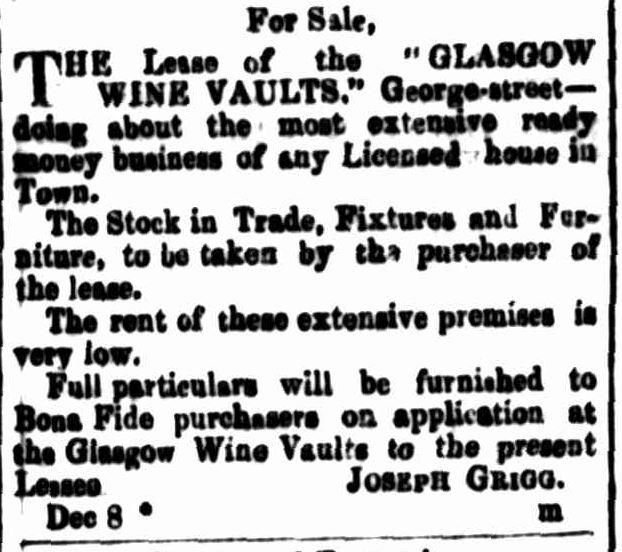
Cornwall Chronicle, 15 December 1860

Cornwall Chronicle, 4 June 1862
From “Quarterly Licensing Meeting”:
TRANSFERS.
The first application was for the transfer of the Glasgow Wine Vaults from Joseph Grigg to Philip Davis.
Mr. Gunn and also the Superintendent of Police intimated that there was no objection to applicant, who was a bootmaker living in Charles-street, and had not held a license before.
Granted.
Launceston Examiner, 5 August 1862
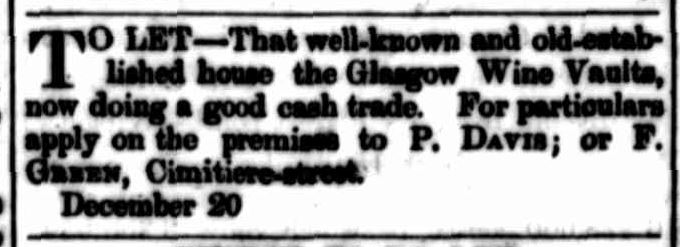
Launceston Examiner, 30 December 1862
Glasgow Wine Vaults.
The Superintendent of Police, Mr Jas. Coulter, said the house was in one of the best positions, but it was one of the worst as a licensed house. It was a mere shell in front with hardly any room for accommodation at the back. If granted a record should be made for improvements to be effected to the building.
Mr Barnes is asked what was the use of the time of the Superintendent and others being taken up in having records made for improvements when they were not carried out. He would not oppose the license of this house, but he merely spoke of it to show that if a record was made it should be carried out.
Mr Button asked if the license was granted would the improvements be carried out ?
In reply to a question from the chairman, Mr Davis the holder of the license said’ the house belonged to Solomon’s estate, and that Mr Solomon had promised him that repairs should be carried out shortly.
On the vote, being taken the license was refused on the ground of insufficiency.
Daily Telegraph, 3 December 1883

Launceston Examiner, 17 December 1883

Launceston Examiner, 8 January 1884
From “Court of General Sessions”:
LICENSING APPEAL.
Philip Davis, landlord of the Glasgow Wine Vaults Hotel, George-street, appealed against the decision of the Licensing Bench, whereby, they refused on the 1st of December to renew his licensee on the ground that the house h was not in repair and did not afford sufficient accommodation.
Mr. Collins appeared in support of the appeal, the police not being represented. Mr. Collins said Mr Davis was taken by surprise by the refusal to renew the license, and was therefore unprepared to support it. On the occasion in question he came forward expecting his license to be granted as it had been for the past twenty one years, during which time no complaint had ever been made of the manner in which he conducted the business. Mr Davis’s tenancy expired in October next, but he could not compel the landlord to make improvements, and he had therefore to appealed so that he would not have to pay rent for a closed house. He would ask those gentlemen present who were not satisfied to visit the hotel and inspect it for themselves. In three months’ time the Solomon estate, of’ which the Hotel was a portion, would be sold, and then Mr. Davis hoped to purchase the hotel. He could then make improvements, but could not be expected to do so before, as possibly he might be outbid for the ownership. Counsel then read a petition largely signed by the neighbours asking the Court to deal favourably with the appeal.
Mr: Farrelly supported the appeal, stating that this hotel was better furnished and in better repair than half a dozen other hotels which had been granted licenses.
Mr Carter admitted that Mr Davis had been unfairly dealt with, and he would support the appeal.
The Mayor said he visited the hotel on Saturday and found it clean and well furnished. He would not be in favour of sanctioning a renewal of the license next year in the present state of the house.
Mr. Turner said he would support the appeal, which was then put to the meeting and allowed on a unanimous vote.
Launceston Examiner, 8 January 1884

Launceston Examiner, 23 April 1884
Death of Another Veteran Colonist.
— We regret to announce the death of a worthy old colonist, Mr Thomas Inall, who died it the advanced age of 81 years, at his residence, Brisbane-street, yesterday morning. Sixty-five years ago Mr Inall arrived here as steward of a vessel which traded for some years between Launceston and Sydney. Being an excellent accountant, he was appointed clerk in the establishment of Mr Thomas Williams, merchant, and afterwards kept a general store in town. He next took the Hope and Anchor Inn, George-street, now the Glasgow Wine Vaults. Mr Yates, father of Mrs Inall, left her with other property, the flour-mill at Corra Linn, and Mr Inall conducted business there for some 20 years.
[continued]
Daily Telegraph, 8 September 1884
From “Launceston Police Court”:
LICENSES GRANTED.-Philip Davis was granted a license to sell liquors at the Sydney Hotel, until the next licensing day. Alfred Davis was granted a license to sell liquors at the Glasgow WineVaults until the next licensing day. Edward Brooks was also granted a license to sell liquors at the St. Patrick’s Hotel until the next licensing day.
Launceston Examiner, 6 October 1884
GLASGOW WINE VAULTS.
Application for transfer of license to Glasgow Wine Vaults, George-street, to
Alfred Cornelius Davis from Philip Davis.
The Police Magistrate said this house was a very inferior one— in fact, he did not know it was allowed to exist. In evidence taken before him at the Police Court recently it was stated that a man left the place at a quarter to 1 o’clock one morning, which he need hardly say was an infringement of the law. He could not see how the house was allowed to exist as a licensed one.
The Chairman thought the remarks would be more applicable at the general meeting, as they could not fairly go into the question when a transfer was only asked for a few months.
Superintendent Coulter said he had no objection to the son of the late proprietor, but he most certainly objected to a renewal of the license. He thought, however, it would not matter much
to grant a transfer for a couple of months.
Sir Hudson said it was distinctly under stood at the last Annual Licensing Meeting that these premises were to be considerably improved.
Mr Coulter — No improvements whatever have been made. The son and daughter who were to manage the business were both unmarried.
It was then unanimously decided that the transfer should not be granted.
Daily Telegraph, 4 November 1884
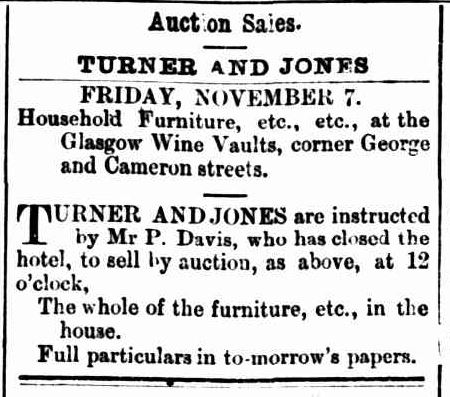
Daily Telegraph, 5 November 1884
The Late Mr. Philip Davis. — A very old townsman, Mr Philip Davis, a resident of Launceston for 32 years, died at his residence, the Sydney Hotel, Elizabeth-street, yesterday, aged 54 years. The late Mr Davis was for 22 years proprietor of the Glasgow Wine Vaults, and prior to joining the licensed victuallers kept a boot shop in Charles-street. He was also a prominent member of the Masonic order, being a mark master mason in the St. John’s Lodge, 34C,I.C. The funeral will take place at 3.30 tomorrow, and the members of the Court Sherwood Lodge, A.O.F., No. 4845, and the Brethren of the Loyal Cornwall Lodge, M.U., are requested to meet at the Sydney Hotel, to attend the funeral.
Daily Telegraph, 12 September 1888
From “After Many Years”:
What primarily led up to the relation of these recollections was the demolition of the, premises, at the corner of George and Cameron streets, where Mr. Connolly for many years successfully conducted the business of a wholesale wine and spirit merchant, later on run conjointly with a grocery, establishment. He it was who was considered most likely to have the history of the old premises at hand, and anticipations in this direction were fully realised.
“It must be 50 years ago, when the place was conducted as an hotel, under the name of the Glasgow Wine Vaults, by ‘Twitty’ Williams,” remarked Mr, Connolly, in response to a question as to how ancient the history of the building was, to his knowledge. Subsequently it was kept for a number of years by Philip Davis, and about the same time was the northern terminus of Page’s coaches, which ran through to Hobart. “Those were the days for competition,” continued Mr. Connolly. “You will hardly believe it, but it is a fact that you would be carried to Hobart for is, so keen was the rivalry among the coaching establishments. About 30 years ago the house lost its license, which was taken away on account of the non-suitability of its accommodation.”
Then it was that Mr. Connolly established himself as a wholesale wine and spirit merchant, as which he was engaged up till six years ago, when he. retired, and was succeeded by Mr. WV. C, Oldham, the present occupier of the premises. In 1894 Mr. Connolly added grocery to his other business, and built the shop immediately on the corner, This, with the premises adjoining, is to be replaced with more up-to-date structures.
Examiner, 10 March 1909
(see photo at top of page)
Wow! What extraordinary work has gone into compiling all this information! Thank you for sharing your research. I do have a question about the Glasgow Wine Vaults (my 2 x great grandmother, Elizabeth Whatmore, travelled out from England in 1851 to help her brother-in-law, James Williams). The Google maps link seems to show the building as the offices of Peter Whish-Wilson, is this correct?
It is. The very last entry above is about the construction of the building that is currently on the corner and the demolition of the previous building which was the hotel.
(I’m not certain it was actually on the corner, at least when it was originally built, but one or two doors further along George St. However, short of building a time machine, I’m not sure I can ever confirm that one or the other.)
Hello there
My great x 2 grandfather was Philip Davis who was the last licensee of the Glasgow Wine Vaults. After that he had the Sydney Hotel in Elizabeth Street where a number of the family lived until the early to mid 20th century.
Oh, that’s interesting. Thanks